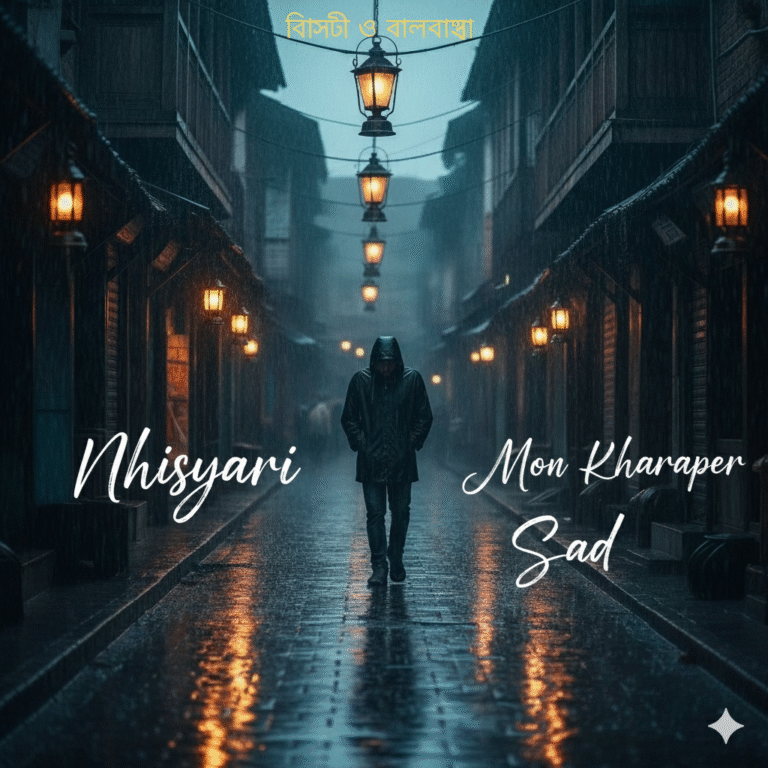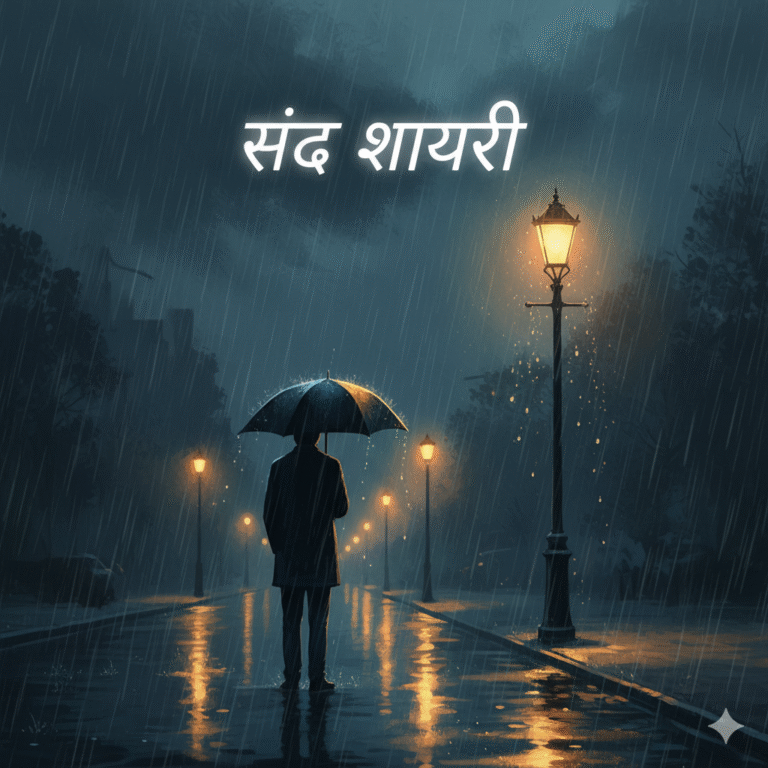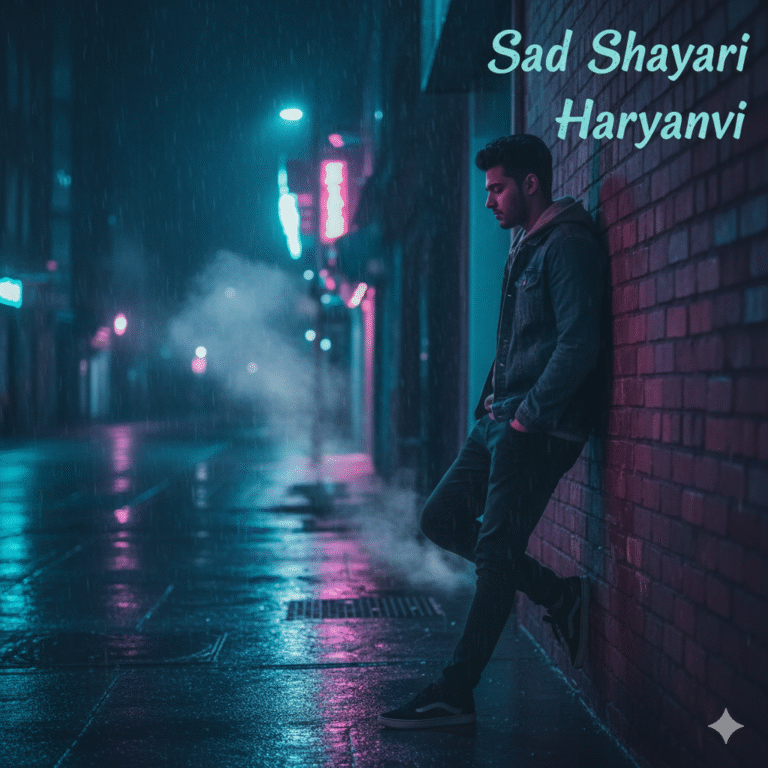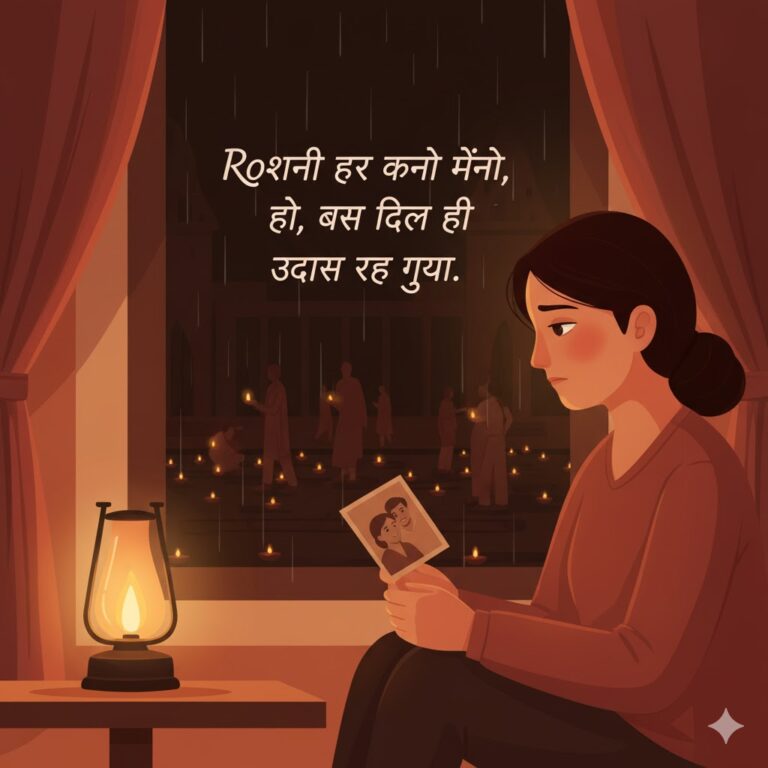Sad Shayari in English 2 Lines – Short Emotional Quotes That Touch the Heart
Two-line sad shayari in english 2 lines are like a quick, sharp ache—small but heavy, packing a whole night’s worth of pain into a single breath. If a verse ever stopped you mid-scroll, tugging at your heart, you know their power. This guide dives deep into why these couplets hit so hard, how to write ones that feel true, how to share them without hurting others, and a big batch of original lines ready for your captions or DPs. I’ve looked at how others structure similar content and built a flow that’s clear and human: what they are, the emotions they carry, tips to craft your own, ways to share them, a stack of examples, and a FAQ tailored to your needs.
No fluff, no recycled clichés—just real words and practical tips for anyone wanting to express pain with honesty or find a line that speaks what they can’t.

Why two lines hit harder than longer poems
Shayari is poetry stripped to its core, where every word pulls its weight. sad shayari in english 2 lines are like a Polaroid of pain—they capture a moment, raw and unfiltered. You don’t get lost in a story; you’re hit with a single, vivid feeling. That instant connection—when you read a line and think, “That’s me”—is why they’re so shareable, so easy to carry in your head, and so brutally clear.
In English, whether translated or original, they aim to keep the same punch as Urdu or Hindi couplets, balancing rhythm and heart. The best ones are sharp yet open, giving you a clear image but leaving space for your own hurt to fill in the gaps.
Shades of sadness — the emotional palette
Sadness comes in flavors, and knowing yours helps you pick or write the right lines:
- Heartbreak: The sting of a breakup, betrayal, or love that slipped away. These lines are raw, sometimes tender, sometimes sharp.
- Longing: Missing someone who’s gone, maybe forever. These feel soft, wistful, like a breeze you can’t catch.
- Loneliness: Feeling unseen, even in a crowd. The voice is quiet, turned inward.
- Grief: Mourning a loss—death, a chapter closed. These can feel heavy or numb.
- Regret and reflection: Wrestling with past choices or mistakes. These lean thoughtful, sometimes bitter.
- Quiet resilience: Owning pain but stepping forward. These have a soft strength, like a bruise you’re learning to carry.
Each shade calls for different words. Heartbreak loves “left” or “broke.” Longing leans on “wait” or “linger.” Loneliness whispers “empty” or “echo.”
Anatomy of a powerful two-line shayari
A great two-line shayari has a simple recipe:
- First line: Paint a picture or set the mood—a specific image or feeling.
- Second line: Deliver the emotional gut-punch—a twist, a deepening, or a truth.
Make it vivid but relatable. Instead of “I’m sad,” try: “Your coffee cup sits untouched; it holds my silence now.” The first line gives a concrete image; the second lands the hurt.
Contrast is key—light vs. dark, presence vs. absence. It creates tension that pulls the reader in, like a tightrope between hope and loss.
Writing tips — crafting two-line shayari that resonate
- Cut the fluff: Skip adjectives like “very sad.” Let nouns and verbs shine: “Rain clings to my window like forgotten promises.”
- Play with sound: Soft rhymes or repeated sounds (like “s” or “m”) add flow. Read it aloud—if it trips, trim it.
- Ditch clichés: “My heart is broken” feels flat. Try: “I count forks in the drawer since you stopped setting the table.”
- Stick to one image: Two lines can’t handle a crowd of metaphors. Pick one strong visual and build around it.
- Keep pronouns tight: Stick to “I” and “you” for intimacy. Too many voices muddle the vibe.
- Leave space: Don’t over-explain. Let the reader step into the poem with their own pain.
Where two-line shayari fit
- Social media: Perfect for Instagram captions, WhatsApp status, or DP text. They’re short, punchy, and look clean.
- Private notes: Slip one into a journal, a letter, or a text to someone who gets it.
- Spoken word: Use as a hook or closer in poetry slams—they’re memorable and sharp.
- Designs: Pair with a moody image—rainy glass, empty bench. Make sure the text pops with clear fonts and contrast.
If you use someone else’s lines, give credit. Stealing a poet’s words without a nod isn’t cool.
The cultural angle — honoring roots in English
Shayari grows from Urdu, Hindi, and Persian poetry—compact, soulful, and rich with metaphor. In English, you’re carrying that spirit forward. Keep the focus on tight images and delicate feelings. Don’t mimic; blend modern life—think city lights or cold coffee—into the classic vibe of longing or loss. If you borrow traditional phrases, like “moon” or “dust,” maybe mention the nod to Urdu poetry in a caption.
English lets you mix slang or fresh imagery, making old-school shayari feel new and alive.
Formatting and style for posting
- Font choice: Sans-serif fonts read clean on phones; thin serifs add elegance. Test for thumbnail clarity.
- Line breaks: Use breaks for rhythm, like: I count my breaths like coins— none buy you back.
- Punctuation: A comma or period can sharpen the vibe, but don’t overdo it. Silence between lines does heavy lifting.
- Graphics: Leave space around text—don’t cram it. If overlaying on a photo, keep eyes visible unless you’re going anonymous.
Ethical posting — don’t turn pain into a weapon
Posting a shayari to process your hurt is real and valid. Posting to guilt-trip or shade someone? That’s a red flag. Public pain on social media can spark drama, especially if it points to a real person. Be mindful. If you’re reaching out for help, a private message to a friend is often better than a vague post. If you’re in crisis, lean on real support—lines are beautiful, but they’re not a lifeline.
Original bank — 300 two-line sad shayari in English
Here’s a collection of original couplets, grouped by vibe. They’re ready for DPs, captions, or inspiration. Each is exactly two lines, built to hit hard.
Heartbreak and breakup
- You left the door ajar; I sleep on its edge now. The house holds your scent, and I count its corners.
- Forever was a coin we flipped; it landed bent. I spend nights chasing the lie we called a promise.
- I hide our photos in a drawer of regrets. Each snapshot’s a country I visit alone.
- Your apology fed the silence; I nodded from habit. Habit warmed me until grief showed me cold.
- Your goodbye was a book left open at the end. I read it nightly, memorizing every crease.
- We finished each other’s sentences; now I end alone. Silence is rude, but I’m learning its rules.
- I collect your hesitations like scattered leaves. They rot faster than your promises did.
- You folded our plans into boats and let them sink. I stand on the shore, kissing soggy hopes goodbye.
- I send texts to a number that forgets my name. My drafts pile up like a museum of us.
- You taught me leaving; I’m fluent now. I speak it in doorways, shops, and old jackets.
Longing and yearning
- My wishes list your name first every night. I sign my evenings with a stubborn hope.
- I walk toward your street; each step’s a small loss. Your doorstep’s empty, and I’m just a guest.
- Your laugh hides under my tongue for rainy days. It’s sugar and storms that won’t quit.
- I build altars from what could’ve been. Candles are cheap; regret burns costly.
- Your silence grows its own words between mine. I read them when my heart quiets down.
- Your window’s open in my mind; I linger outside. The breeze carries you, leaving me hungry.
- I wait like a bus at midnight, no routes left. Lights pass, and my hands stay pocketed.
- I practice your name for a surprise return. My voice shakes, unprepared for courage.
- I reserve your spot at a table for two. The waiter sets plates; the air walks away.
- My longing’s a drizzle, soaking me slow. It collects on my lashes, quiet and heavy.
Loneliness and invisibility
- I’m loud in small rooms, unseen in crowds. My smile’s a lie I’ve practiced too well.
- My phone’s my friend, holding letters I won’t open. Notifications glow like candles in an empty room.
- My footsteps’ echo is my oldest friend. It knows my rhythm better than anyone.
- I invited the moon; it had prior plans. Its light left a note and no space for me.
- Loneliness isn’t a guest; it’s my roommate. It leaves dishes and bills in my name.
- My table’s silence is generous with extra chairs. I don’t know who to invite anymore.
- I name people I’ll never meet to pass the time. They keep me busy between sunsets.
- I rehearse talks no one will ever hear. The empty room claps, but it’s not enough.
- My calendar’s full of “maybe” slots. The maybes never show up.
- The couch holds a space for absence beside me. I sit there, trying to keep it warm.
Grief and mourning
- I planted your memory in the yard; tears grew it tall. It’s a silent tree holding every secret I buried.
- Your chair knows your weight; I ask it to share. Its cushion replies with an ache.
- I set a plate for you; it cooled untouched. The food sits like a story whispered too soft.
- Grief’s a door no key fits; I knock anyway. The hallway keeps my echoes as keepsakes.
- Your days are locked in a drawer I can’t open. Forcing it makes the hinges weep rust.
- Time heals, they say; it’s slow and bureaucratic. I filed a complaint and stood in line.
- Your name’s a melody stuck without a chorus. I hum it at dawn till the neighbors complain.
- I kneel without crumbling, learning the difference. Prayer’s my practice for staying upright.
- The house keeps your shoes like evidence. They speak of someone who once walked through.
- I write to the streets we loved; they don’t reply. Dust and birds are their only answers.
Regret and reflection
- I swapped tomorrow for a yesterday I thought was forever. Now I shop in the clearance aisle of mistakes.
- Regret’s my currency; I could’ve bought us back. My pockets hold pennies and unwritten apologies.
- I learned the right words too late to say them. Timing’s a lesson I never mastered.
- I replay kindnesses and failures like old tapes. The critic in me is tired of my errors.
- The road I skipped is paved with soft regret. It’s clean, lonely, and slightly downhill.
- I promised a future but missed the fine print. The returns policy was cold and unclear.
- My better self lives in a box marked “someday.” It’s a small, hopeful liar.
- I apologize to walls; they’re my best listeners. They take my voice and give it back unchanged.
- Your last apology came wrapped in cheap perfume. Sincerity doesn’t ship well in budget wrapping.
- Some bridges aren’t meant for second crossings. Burn marks make lousy souvenirs.
Quiet resilience and acceptance
- I’m sad but not a monument to it. My grief ages; I outlast it.
- I wear my scars like a jacket, patched with time. They look better with every mend.
- I train small joys like they’re new muscles. They hurt first, then they carry me.
- The tide takes but leaves shells behind. I pocket the sea’s forgotten gifts.
- I walk roads that don’t ask for permission. My feet push on when my heart’s tired.
- My wound’s a map; I learn where not to step. My feet are faster than my heart at forgiving.
- I write gratitude in messy, cramped lines. It’s sloppy but means something.
- Quiet streets and kettles keep me company. They don’t judge or leave notes.
- I say “I was hurt” without needing a stage. Honesty’s my quietest rebellion.
- I’ll miss you, then I’ll live. Both truths fit in my hands.
Adapting classic shayari vibes into English
Traditional shayari loves metaphors like moonlight, wine, or dust. To make them fresh in English, swap for modern images: moonlight becomes a streetlamp, wine turns to cold tea, dust is the ash of old promises. Keep the soul—intense, compact emotion—but use your world. For example: “Your face lingers on my pillow’s edge; dawn steals it like a quiet thief.” Same longing, new skin.
Editing exercise — turn a ramble into two lines
Start with a long thought: “I miss you so much it’s hard to breathe, and every time I think of you, I lose my breath again.” Trim it: pick one image, sharpen the verbs.
Result: “You taught my lungs to wait; your memory steals my breath.”
That’s the alchemy of two-line shayari—distilling pain into something that sings.
Posting etiquette and captions
Decide if you want replies before posting. A caption can set the tone: “Not ready to talk, but thanks” or “DM me if you’re close.” This keeps things clear. If your shayari hints at someone specific, know that public posts invite gossip—be ready for that. If you’re struggling, a direct text to a friend beats a vague post. In crisis? Reach out for real help—poetry’s a spark, not a rope.
Using two-line shayari beyond social media
These couplets shine in private spaces too—a diary entry, a note tucked in a book, a voicemail greeting. In spoken word, they’re great as a refrain or a mic-drop closer. They hold their own because they’re so tight and vivid.
Teaching shayari — quick prompts
Want to write your own? Try these:
- First line: an object. Second line: what it means emotionally.
- Use a weather image to show your mood.
- Rewrite a cliché into a small, everyday scene.
These build the skill of saying big things in small spaces.
FAQs — straight-up answers
What makes a two-line shayari effective?
A clear image in the first line, a heart-twist in the second. Every word counts, and the feeling has to land fast.
Can I use two-line shayari for statuses or DPs?
Yep—they’re perfect for captions or profile pics. Pick a clear font and a moody image with strong contrast.
Is it okay to use famous poets’ lines?
Short lines are fine if you credit the poet. Don’t claim someone else’s work as yours—respect the craft.
How do I credit translated shayari?
Note the original language or poet and say “translated” or “inspired by.” It honors the roots and shares the love.
What if my shayari upsets someone?
Add a caption like “DM if you want to talk” or use a content warning. If someone’s triggered, offer support or resources.
How to format for social posts?
Center the text, use clean fonts, leave space around it. Test it small to make sure it’s readable.
Why write in English instead of Urdu or Hindi?
English reaches more people and lets you weave in modern vibes. Pairing it with an original line adds depth.
How to write when I’m raw?
Write freely, then sleep on it. Edit when you’re calmer to find the sharpest words.
Closing — two lines, endless heart
sad shayari in english 2 lines is a tiny spark that lights up your pain. It’s a way to be honest, to hold a quiet moment, or to signal you need someone. Use these lines, tweak them, or write your own—they’re small enough to share and big enough to carry your world.







